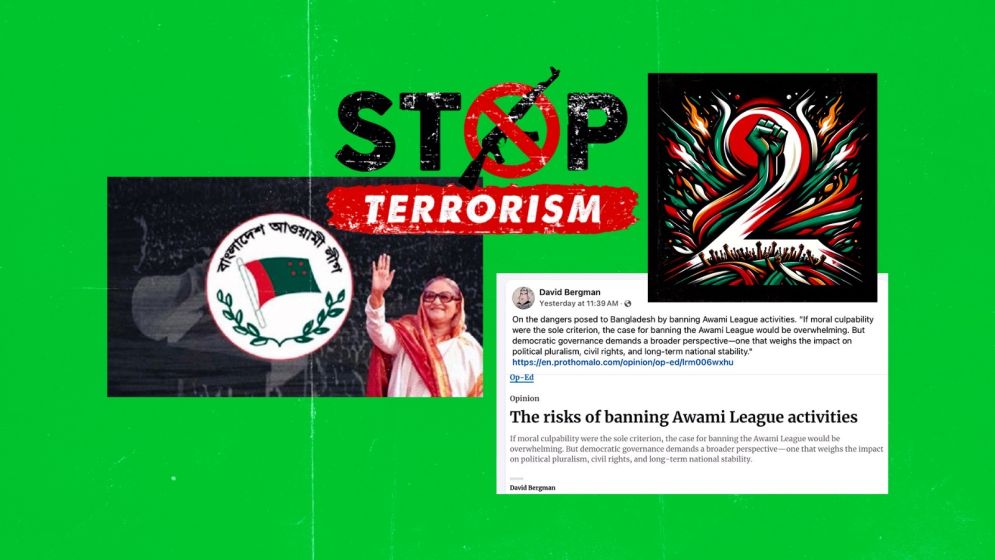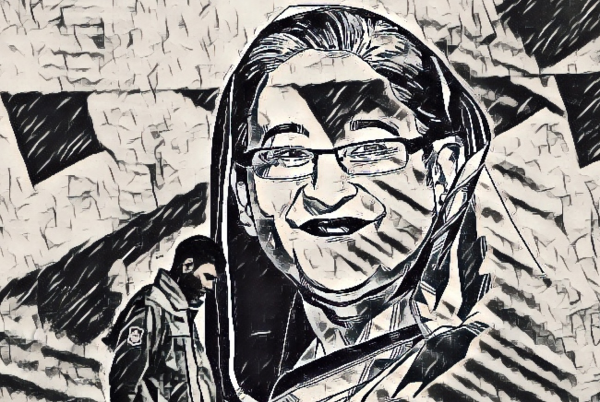David Bergman’s article on the risk of banning Awami League misses the point

In the aftermath of the ban on Bangladesh’s Awami League, a party that ruled unchallenged for 15 years until it was toppled by a sweeping nationwide movement, my friend, the British journalist David Bergman, wrote a reflective column in Prothom Alo.
He argued, rightly, that outlawing a party so deeply woven into Bangladesh’s political fabric will have long-term consequences. But in doing so, he also glossed over the very rot that led to its downfall.
He makes a case against proscribing the Awami League by emphasizing that many of the deaths during the July–August 2024 uprising were at the hands of law enforcement, not party members.
But this separation is artificial. It overlooks a grim reality: under the AL's rule, state institutions were politicized beyond recognition. The distinction between the party and the police is not just blurred–it is deliberately collapsed.
The protest movement began with legitimate outrage over the distortion of the civil service quota system. For over a decade, recruitment into government jobs, particularly within the police force, was steered by political loyalty.
Party operatives, often hailing from AL strongholds, were installed across public institutions under the guise of bureaucratic neutrality. The final "background check" for civil service hopefuls wasn’t a measure of merit but of pedigree–specifically, the political kind.
If your family didn’t pledge allegiance to the ruling party, your application quietly found its way to the bottom of the pile.
This partisan filtration was no accident; it was design. The machinery of the state was rigged to serve the regime, and when the uprising came, it responded just as it was built to—with bullets.
To pretend that the violence was the work of rogue officers disconnected from party command is to ignore the very architecture of repression that the Awami League put in place.
Bergman points out that the AL has shown no contrition since its fall. That’s undeniable. But he also seeks to defend the “millions” of ordinary party supporters, arguing they played no part in the regime’s abuses.
True, most supporters didn’t pull the trigger. But where was their outrage when unarmed students were being brutalized in the streets? Where was their dissent as the party transformed into a monolith of impunity and fear?
The unwillingness of ordinary supporters to denounce a regime that used state violence against its own children speaks to a deeper moral abdication.
In shielding the rank-and-file from responsibility, Bergman inadvertently underscores the very problem he seeks to explain: the normalization of repression, and the collective amnesia that often follows a fallen regime.

The perils of selective amnesia
The ban on the Awami League may well be a blunt instrument, and its implications for democratic pluralism deserve scrutiny. But let’s not rewrite the past as we step into the future.
A party that weaponized the state, co-opted public service, and authorized lethal force against dissent cannot be absolved so easily. Accountability must begin with remembering who built the system–and who watched in silence as it crushed the people beneath it.
Nearly a year has passed since the July–August uprising, and still, not a word of remorse has emerged from the Awami League or its student wing.
Instead, their rare public statements have been spent smearing the interim government and dismissing the popular revolt as a foreign conspiracy or mob hysteria.
What they haven’t addressed are the viral images that have etched themselves into the national conscience: masked men in party helmets firing into crowds, others wielding machetes in broad daylight–while police watched, unmoved.
David Bergman argues that millions still support the AL because of its historical legacy–the party of liberation, the standard-bearer of secularism and social liberalism.
Certainly, no one can erase the Awami League’s role in 1971. But over the past decade, it turned that legacy into a blunt instrument, wielded against anyone unwilling to bow to its mythology.
Dissenters–no matter how decorated or sincere–were branded traitors. Even the wartime role of Ziaur Rahman, commander of the Z Force and later President of Bangladesh, became fair game for revisionist ridicule.
The party line on the Liberation War became less about truth and more about loyalty. Any deviation from the official script meant exile from public discourse.
So let’s concede the Awami League's place in history. But the claim that it upheld social liberalism deserves far more scrutiny. A central tenet of liberalism is the protection and expansion of civil and political rights. Under the AL's watch, these rights were not safeguarded–they were systematically dismantled.
Take the 2011 repeal of the caretaker government system, a constitutional mechanism that once ensured neutral election oversight. The annulment was neither debated in good faith nor put to the people.
Instead, it was declared a “historic step for democracy,” a laughable claim given the context. What followed were years of elections so farcical their outcomes were often known weeks in advance.
The ballot box became a prop, the opposition an afterthought, and the voter a bystander to their own disenfranchisement.
Meanwhile, the regime erased uncomfortable truths from the national record. Histories documenting the country’s post-independence chaos–the famine, the rampant corruption, the silencing of the press, the banning of opposition parties–were quietly pulled from bookstore shelves.
In their place, a sterile, state-approved version of history was fed to a generation that grew up knowing only what the ruling party permitted them to know.
If this is social liberalism, then Orwell owes us royalties.

An awakening to the realities
The harsh truth is, a party that jails dissenters, manipulates the judiciary, polices historical memory, and stages sham elections has no claim to liberal values.
That many ordinary Bangladeshis still support the Awami League is not evidence of its ideological purity–it’s a testament to the long reach of fear, propaganda, and patronage.
The question we must confront now is not whether banning a political party is a democratic ideal–it isn’t. But neither is allowing a party that hollowed out every democratic institution to rebrand itself as a victim of repression.
Justice demands honesty. And if the Awami League wants a future in Bangladesh’s political life, it must first reckon with its past–not rewrite it.
Bergman also argues that banning the Awami League deprives its supporters of their right to peaceful political gatherings. One wonders: is peace really the first word that comes to mind when recalling the events of July and August 2024?
Before invoking the rhetoric of rights, party loyalists might start with something more basic–an unqualified apology.
An apology for the thugs in helmets who fired on students. An apology for the party-backed mobs who chased protestors with cleavers and pipes. An apology for the silence of the party’s leadership as streets turned into war zones.
Until the Awami League can acknowledge this carnage, its demand for “peaceful assembly” rings hollow.
Yes, there are valid concerns about the precedent a political ban sets for free speech and association. But free speech is not the freedom to fabricate history. And political rights do not extend to the systemic gaslighting of a nation.
For eight months now, pro-AL commentators–both domestic and diasporic–have flooded the information space with distortions, denials, and outright propaganda. Not a shred of contrition. Not a moment of reckoning.
Let’s be clear: the July–August uprising was not a blip. It was the climax of a long-simmering fury–rooted in over a decade of unchecked corruption, extrajudicial killings, enforced disappearances, rigged contracts, politicized policing, ideological brainwashing, and grotesque financial misdeeds.
That kind of rot doesn’t happen overnight. It festers–under the watchful eye of those now asking for tolerance and leniency.
In every civilized society, accountability precedes redemption. A person who commits a serious offense is not immediately welcomed back into the fold without consequences.
A killer must face justice. A swindler must repay what was stolen. Rehabilitation demands remorse. Why should a political party be exempt?
We do not need to be reminded of the Awami League’s role in 1971. That history is secure. But a party cannot forever coast on the fumes of liberation while trampling on the very freedoms that independence was meant to guarantee.
The past cannot be used to excuse the present indefinitely.
What’s needed now is humility–from party leaders and, yes, from the millions of supporters Bergman mentions. Supporters who may not have fired a bullet, but who looked away, who cheered, or who rationalized every abuse with tired invocations of history.
If they can look at the years of AL rule with any intellectual honesty, they will understand why the road back to politics must begin not with indignation, but with repentance.
—

